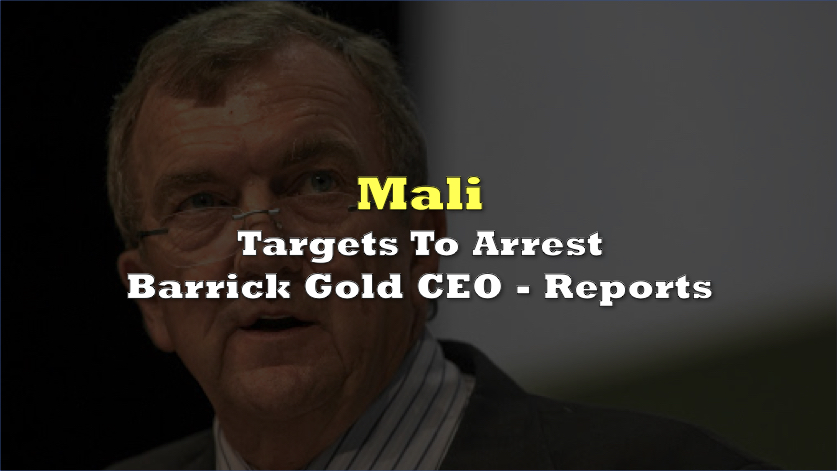Mali’s military-led government continues to escalate its pressure on foreign mining companies, detaining executives and employees as disputes over unpaid taxes, royalties, and revised mining agreements intensify.
This week, four employees of Barrick Gold Corporation (TSX: ABX) were arrested at the company’s Loulo-Gounkoto mining complex, further straining relations between the government and one of the world’s leading gold producers.
Barrick has denied the charges and remains committed to finding an amicable resolution. However, this latest incident highlights broader concerns among international investors about Mali’s growing hostility toward foreign firms operating in its lucrative gold mining sector.
Malian junta government when they think you owe back taxes.$GOLD $ABX.to https://t.co/REYE4soD4G pic.twitter.com/BVtd17XX5y
— Ben Kramer-Miller (@TheWealthMiner) November 26, 2024
Barrick Gold confirmed the detentions in a statement on November 26, describing the arrests as “unjust” and emphasizing the company’s ongoing efforts to engage with the Malian government. CEO Mark Bristow stated, “Our attempts to find a mutually acceptable resolution have so far been unsuccessful, but we remain committed to engaging with the government to resolve all the claims levied against the company and its employees and to secure the early release of our unjustly imprisoned colleagues.”
The arrests come as part of Mali’s push to collect an estimated $512 million in retroactive taxes and dividends from Barrick, stemming from audits conducted between 2020 and 2022. Barrick has labeled these claims as “without merit,” citing a November 2023 notice for $417 million in taxes as similarly unfounded. Despite this, tensions have steadily risen, with previous incidents of employee detentions reported in September.
Mali’s actions against Barrick are part of a broader strategy to increase state revenues from mining operations. Following a 2020 coup, the military junta implemented a revised mining code that raised the state’s stake in mining projects to 35%—up from 20%. Although initially presented as applicable only to new contracts, the government has increasingly sought to renegotiate existing agreements.
Other companies, including Resolute Mining Ltd. (ASX: RSG), AngloGold Ashanti (NYSE: AU), and Allied Gold Corp. (TSX: AAUC), have also faced significant pressure. Earlier this month, the government detained Resolute’s CEO, Terry Holohan, along with two other executives, demanding $160 million in unpaid taxes for their Syama mine.
Similarly, Allied Gold recently agreed to pay $116 million to settle its financial obligations, underscoring the high stakes for companies seeking to maintain operations in Mali.
Gold in Mali
Gold mining is critical to Mali’s economy, accounting for approximately 10% of GDP and 70% of export revenues. The Loulo-Gounkoto complex alone produces an estimated 510,000 ounces of gold annually, making it one of the country’s most significant industrial assets. The Malian government holds a 20% stake in the operation, with Barrick owning the remaining 80%.
Mali’s reliance on gold revenues has grown as the country faces regional sanctions and limited access to international debt markets. The junta views increased control over mining revenues as essential for economic stability. However, its aggressive tactics—such as detaining executives and demanding retroactive payments—are creating significant risks for foreign investors.
While the government’s approach may yield short-term financial gains, it risks undermining Mali’s attractiveness to future investors. Detentions and financial disputes have already affected market confidence, with Resolute Mining’s shares falling by 35% since news of its executives’ arrests broke. Barrick and other companies have similarly expressed concerns about the uncertain regulatory and operating environment.
Assane Sidibe, president of Mali’s mining commission, previously suggested that the revised mining code would not affect existing agreements. However, recent developments suggest otherwise, prompting accusations of bad faith negotiations. Industry analysts warn that the junta’s actions may deter essential foreign investment, hampering broader economic development goals.
The situation remains precarious for Barrick and other mining companies operating in Mali. With significant production and employment tied to their operations, any disruption could have far-reaching economic consequences. Barrick has stated that it will continue working to resolve disputes and safeguard the future of its Loulo-Gounkoto complex, but the path forward remains fraught with challenges.
Information for this story was found via the sources mentioned. The author has no securities or affiliations related to the organizations discussed. Not a recommendation to buy or sell. Always do additional research and consult a professional before purchasing a security. The author holds no licenses.









